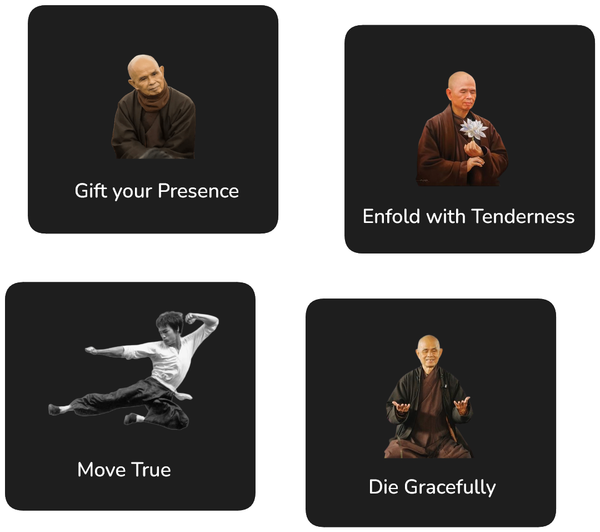Book Review: Awareness by Anthony de Mello
"Awareness" is an invitation to embark on a journey of profound self-discovery; but it is not for the faint-hearted.

YouTube is one social network I frequent, and it serves as a dynamic canvas for my varied passions. Last December, my attention was captured by philosophers who meld Eastern and Western thought—a discovery I credit to YouTube's smart algorithm, which likely picked up on my interest in thinkers like Thich Nhat Hanh.
Among the recommendations were the lectures by Alan Watts, whose name many will recognise. Another recommendation were recordings of Anthony de Mello, a Jesuit priest whose lectures—despite their poor video and audio quality—resonated deeply with me.
De Mello's distinctive approach and profound insights immediately struck a chord with me. Eager to explore his work further, I sought out his books. His books aren't conventional narratives but rather collections of stories like those in "The Prayer of the Frog," or edited transcripts of his talks.
"Awareness" falls into this latter category. Approaching it is initially odd; it reads like spoken language rather than polished prose. Yet the compelling ideas within make any initial discomfort well worth overcoming.
In this review, I will discuss many of the key ideas in "Awareness" and you can be your own judge if this unconventional book might just change how you see the world.
Key Ideas
Presence in the Moment
Anthony de Mello's book "Awareness" is a guide to living more fully by being present in the moment. The title itself captures the essence of his message: by anchoring ourselves in the here and now, we tap into a deeper level of existence. De Mello suggests that this presence allows us to experience life's richness and connect with something greater than ourselves, which he equates with the divine. This state of 'waking up' can lead us to true happiness, as we become more attuned to life's wonders.
Illusion of the 'I'
De Mello challenges readers to question their self-identity, suggesting that much of what we consider our 'self' is an illusion. He argues that our concept of 'I' is often inflated with roles and titles that are transient—like being a doctor—and when these are stripped away, we suffer unnecessarily. According to de Mello, this suffering stems from mistaking these temporary attributes for our true essence. By peeling back these layers to reach the core of our being, he asserts that we can become impervious to external factors that previously caused us distress.
He says:
If you’re lucky and the gods are gracious or if you are gifted with divine grace [...], you might suddenly understand who “I” is, and you’ll never be the same again, never. Nothing will ever be able to touch you again and no one will ever be able to hurt you again. You will fear no one and you will fear nothing.
This statement encapsulates de Mello's belief in the transformative power of understanding our true nature beyond superficial labels.
Attachment and Desire
Anthony de Mello's exploration of happiness in "Awareness" delves into the complex web of attachment and desire. He presents a challenging premise: our pursuit of desires is the very obstacle to achieving profound happiness and contentment. De Mello anticipates resistance, understanding that most people are reluctant to relinquish their attachments because it means letting go of not just trivial wants, like a craving for sweets, but also those desires we deem noble or beneficial.
His ideas question our categorisation of desires as good or bad, often dictated by societal norms. For instance, consider a student working towards a degree with the hope of securing a stable job and future comforts. De Mello would ask: Are you willing to abandon your degree if it meant attaining true happiness? This question strikes at the heart of our desire-driven existence. As long as we harbour these aspirations—be they for education, career success, or material possessions—we remain shackled to potential unhappiness.
The Misconception of Love
De Mello extends his scrutiny to love—a sentiment often romanticised and misunderstood. He argues that true love is not possible when it's entangled with desire, whether that's desiring someone's company or worrying about their health. Such attachments set us up for suffering because they're rooted in possessiveness and control rather than genuine affection.
He confronts us with a stark truth:
It’s been there all along, staring us in the face in the scriptures, though we never cared to see it because we were so drowned in what our culture calls love with its love songs and poems—that isn’t love at all, that’s the opposite of love. That’s desire and control and possessiveness. That’s manipulation, and fear, and anxiety—that’s not love.
The challenge he presents is clear: Do we cling to our version of love—with all its conditions—and accept the resulting pain? Or do we strive for an enlightened form of happiness devoid of these binds? Most people would argue that their affection for loved ones is non-negotiable; they accept the emotional impact as part of those relationships. But de Mello counters this by asserting that such choices make us to suffer rather than leading us towards contentment.
He sums up this paradoxical human condition:
I was saying that we don’t want to be happy. We want other things. Or let’s put it more accurately: We don’t want to be unconditionally happy. I’m ready to be happy provided I have this and that and the other thing.
De Mello invites us on a journey towards self-discovery—a path less travelled because it demands shedding layers of deeply ingrained desires and confronting uncomfortable truths about what we mistake for love. His message is both simple yet profoundly difficult: only by releasing these attachments can we hope to achieve true awareness—and with it, an enduring sense of peace.
Religion and Universality
Anthony de Mello's take on religion in "Awareness" is quite intriguing, especially given his background as a Jesuit priest. One might expect a heavy reliance on Biblical teachings, but de Mello seems to address an audience already well-versed in such matters. Instead, he adopts a more inclusive perspective, suggesting that all religions share fundamental truths that mirror the principles he espouses.
He speaks with reverence of mystics and sages across various traditions, placing Jesus among them but also acknowledging figures like Buddha and other Eastern philosophers. This inclusive approach to spirituality may explain why, after his death, Cardinal Ratzinger—later Pope Benedict XVI—criticized some of de Mello's ideas. Despite this controversy, his works continue to be available, albeit sometimes with a cautionary note in Catholic bookshops. His view of religion as a tapestry of universal truths challenges us to look beyond dogma and find the common threads that unite different faiths.
Self-Observation and Understanding
As a psychologist, de Mello offers valuable insights into self-understanding through observation. He encourages readers to become keen observers of their own emotions and reactions without judgment or the impulse to change them. This process of observation allows us to recognise the illusions that cause us pain.
De Mello's advice is simple:
How are you going to understand what you disapprove of, or what you approve of, for that matter? All of this sounds like a new world, doesn’t it? No judgment, no commentary, no attitude: one simply observes, one studies, one watches, without the desire to change what is. Because if you desire to change what is into what you think should be, you no longer understand.
By adopting this stance of neutral curiosity towards our inner experiences, we can gain clarity about who we are beneath our conditioned responses and societal roles. This self-awareness is pivotal in moving towards the freedom from illusion that de Mello advocates for throughout "Awareness."
'Treating' Depression
Anthony de Mello offers an alternative perspective on dealing with negative emotions such as depression. He suggests a shift in how we perceive our emotional states, which can provide relief from suffering. Instead of identifying with the emotion, he advises recognising it as a transient experience:
You say, “I’m depressed.” But that is false. You are not depressed. If you want to be accurate, you might say, “I am experiencing a depression right now.”
De Mello outlines a method for alleviating suffering through self-awareness:
Put this program into action, a thousand times: (a) identify the negative feelings in you; (b) understand that they are in you, not in the world, not in external reality; (c) do not see them as an essential part of “I”; these things come and go; (d) understand that when you change, everything changes.
This approach includes embracing change without attachment. While de Mello argues against desiring anything or being attached to anything, he acknowledges the paradox of wanting to contribute positively to the world. To this end, he asserts that true understanding must precede action to avoid unintentional harm.
When there’s something within you that moves in the right direction, it creates its own discipline.
Change
De Mello critically examines our motivations behind seemingly selfless acts and cautions against actions driven by selfish desires—like wanting to be seen as virtuous by others. He warns that our efforts to improve situations could inadvertently cause more harm than good if we lack awareness and particularly self awareness.
His advice is to focus on understanding—both ourselves and others—believing that genuine change will naturally follow without force:
Now, the danger of attempting to change others or change things when you yourself are not aware is that you may be changing things for your own convenience, your pride, your dogmatic convictions and beliefs, or just to relieve your negative feelings.
By prioritising comprehension over action and letting go of the desire for control or recognition, de Mello believes we can instigate authentic transformation within ourselves and potentially influence our surroundings positively.
Conclusion
Anthony de Mello's "Awareness" is an invitation to embark on a journey of profound self-discovery. It challenges us to confront the illusions that govern our lives—our attachments, desires, and misconceptions about love and happiness. De Mello's insights are as unsettling as they are enlightening, pushing us to question the very foundations of our identity and the way we interact with the world.
Through his teachings on presence, self-observation, and understanding the universality of religious truths, de Mello offers a roadmap to a life of true awareness. His perspective on treating negative emotions like depression with detached observation rather than identification provides practical guidance for those seeking inner peace.
It's clear that "Awareness" is not for the faint-hearted. It demands an open mind and a willingness to let go of long-held beliefs. Yet, for those ready to take up de Mello's challenge, the rewards are can be great—a sense of liberation from suffering and an enduring contentment that comes from within.
In essence, Anthony de Mello doesn't offer easy answers but instead guides us towards asking better questions—about ourselves, our relationships, and our place in the universe. If you're prepared to dismantle your constructed self and embrace change without attachment or desire for control, "Awareness" might just be the catalyst you need to transform your life.
If you find the ideas discussed in this article agreeable, you may want to have a look at my article Five Steps to Peace—I provide a more condensed version of de Mello's teachings and also link them with those of Thich Naht Hanh.





